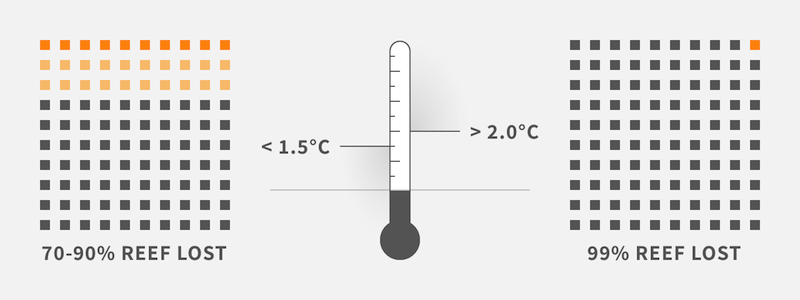If global temperatures increase by 2 degrees and sail on past it, the ability to learn how to survive under such conditions becomes exponentially harder.
The United Nations Intergovernmental Panel on Climate Change (IPCC) released a special report on Monday explaining the science around what the world can expect if global average temperatures increase beyond 1.5 degrees celsius. States agreed to work towards keeping well below this target in the Paris Agreement, and the full implications of failing to do this make for some pretty alarming reading.
The report notes that the difference between 1.5 and 2 degrees of warming is significant and urges governments to do everything they can to aim for the lower target. Sea level rise, more temperatures extremes of both hot and cold, changes in global distribution and frequency of rainfall, and extreme weather events, will all be worse if the world increase goes beyond 2 degrees, and less severe if kept well below.
The world has already passed 1 degree of warming above pre-industrial levels. Time is running out. The IPCC estimates that there are 10–15 years to dramatically reduce carbon emissions before locking in global warming beyond 2 degrees, and most likely 4 degrees, by the end of this century.
The report makes it clear that there is both the knowledge and the technology to make these changes. All that is needed is strong leadership and positive action.
For example, if global warming is kept under 1.5 degrees, coral reefs around the world are projected to decline by 70–90%. Shoot past 2 degrees, however, and that figure jumps to a decline of 99%, the difference essentially between having some remnant coral reefs still in existence versus the complete eradication of coral ecosystems.

Likewise, comparing the impacts on human security under the two different warming scenarios is instructive. The report warns:
Limiting global warming to 1.5°C, compared with 2°C, could reduce the number of people both exposed to climate-related risks and susceptible to poverty by up to several hundred million by 2050.
The several hundred million more people at risk due to climate change will be more vulnerable to weather related disasters, displacement due to food insecurity and loss of livelihood, adverse health impacts, and potentially climate related violent conflict.
The vast body of scientific research also makes it abundantly clear that human and non-human species will need to adapt as the climate changes. This is true under both scenarios. Yet adaptive capacity, the options and mechanisms to help human and natural ecosystems do this, are stronger under the lower overall rise in temperature. If the world hits 2 degrees and sails on past it, the ability to learn how to survive under such conditions becomes exponentially harder.
The scientific evidence is unequivocal: to keep to the 1.5 degree target, the global community must reduce its carbon emissions by 45% below 2010 levels by 2030. By 2050, it must have reached net zero emissions. What this means is that any carbon emissions, say from the fact that permafrost in many parts of the world will continue to thaw, releasing methane into the atmosphere, must be balanced by mechanisms that take that carbon out of the atmosphere.
In order to achieve this the IPCC points to the overwhelming evidence of a need for:
Rapid and far-reaching transitions in energy, land, urban infrastructure (including transport and buildings), and industrial systems.
Fundamental change on such a large scale will be difficult, but the alternative is to condemn millions of people to extraordinary suffering in the short term, while leaving the next generations a planet that will be unrecognisable in the long term. It will also ensure the extinction of untold species and the collapse of many of the Earth’s ecosystems that we depend on for survival.
But this is not just about survival. It is, as the report notes, an opportunity to rethink the way global development is understood, to ensure that it unfolds along a sustainable and socially just pathway. Governments and world leaders have a unique ethical and moral responsibility, as the holders of immense power, to make the policy choices now that will make it possible for all human and non-human species to flourish on this planet for centuries to come.

